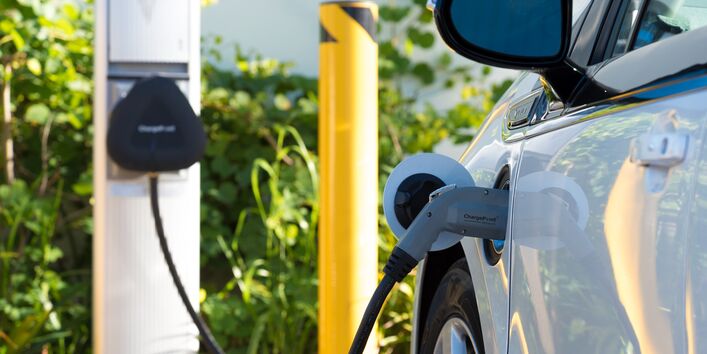Climate benefit for electric cars confirmed
Vehicles have an impact on the environment and climate not only during operation, but also during production and disposal. According to a recent study commissioned by the German Environment Agency (UBA), electric cars registered in 2020 are around 40 per cent more climate-friendly than cars with petrol engines. With a rapid expansion of renewable energy production, this climate advantage will increase to around 55 per cent for cars registered in 2030. UBA President Dirk Messner comments: “Electric vehicles are an essential building block for achieving the climate targets in Germany. In order to make their purchase more attractive, cars with higher CO2 emissions should be subject to a surcharge for new registrations in future. This is the only way we will be able to achieve the German government's target of 15 million electric cars by 2030.”
The study analysed and compared the environmental and climate impact of passenger cars and commercial vehicles with conventional and alternative drive systems in detail, based on the entire vehicle life cycle. According to the results of the study, the climate benefit for electric passenger cars increases from 40 per cent when registered in 2020 to up to 55 per cent for cars registered in 2030 if renewable energies are rapidly expanded. The benefit to the climate will remain even if the proportion of e-fuels produced from renewable energy for cars with combustion engines increases significantly in the coming years.
Not only climate impact analysed
For some environmental impacts, there are still some disadvantages for electric cars registered in 2020. In particular, the effects on water (aquatic eutrophication) and soil (acidification) must be weighed against the climate benefits of their use.
The disadvantages of electric cars are largely due to the fact that electricity is still generated from fossil fuels. In the course of the ongoing transition to a renewable electricity system, these disadvantages will continue to diminish. In 2050, the electric car will be ahead of cars with combustion engines in all the environmental impacts analysed. For example, electric cars will also cause around 27 per cent less aquatic eutrophication than petrol cars. In addition, electromobility increases the demand for and mining of raw materials, some of which are critical, such as cobalt, nickel and lithium. However, the supply of primary raw materials can be reduced in the long term through appropriate recycling.
Targeted, budget-neutral measures such as a reform of the motor vehicle tax, which levies a surcharge for cars with high CO2 emissions in the first year of registration of a new car, offer advantages when it comes to a rapid ramp-up of electromobility. This could be much more effective than the cancelled purchase premium. However, in order to reduce the environmental and climate-damaging effects and make transport even more climate-friendly more quickly, a transport transition involving avoidance, modal shift and improvement remains important. Every journey avoided saves electricity or fuel and protects people and the environment.
HGVs also considered
The study also analysed the environmental impact of heavy goods vehicles. HGVs that use liquefied natural gas (LNG) have no advantages over diesel HGVs either for those registered in 2020 or those registered in 2030. Electric articulated lorries will have clear climate advantages for vehicles registered in 2030. Due to the high mileage of HGVs, the use phase is even more relevant than for passenger cars – meaning that emissions during vehicle and battery production are not as significant.
Battery-electric articulated lorries or those with overhead lines and batteries will already have a 73 to 78 percent climate advantage over vehicles with combustion engines registered in 2030 if renewable energies are rapidly expanded; otherwise the figure will be 55 to 60 percent. These vehicles will also cause fewer greenhouse gas emissions than combustion engines in 2050.
In general: In order to utilise the climate and environmental benefits of electric vehicles, a corresponding development and expansion of charging infrastructure is urgently required. Rapid action is required here, especially for HGVs, as there is currently a large potential demand due to the reduced HGV toll for electric HGVs.
Background
The study "Analysing the environmental footprint of motor vehicles with alternative drive systems or fuels on the way to greenhouse gas-neutral transport" was commissioned by the German Environment Agency (UBA) and carried out by ifeu – Institute for Energy and Environmental Research Heidelberg. As well as greenhouse gases, the study also analysed energy, resource and water consumption and pollutant emissions to air, water and soil. In addition to the direct environmental impact of vehicle use, the environmental impact of the production of vehicles, fuels and power plants was also analysed in detail as a so-called “background system”. The analyses were carried out for vehicles registered in 2020, 2030 and 2050.
Further information:
Aquatic Eutrophication
Aquatic eutrophication is a measure of the nutrient input (including nitrogen and phosphorus) into rivers, lakes and oceans which leads to an increase or acceleration in the growth of algae. This can result in large-scale algal blooms, including species that produce toxins, which lead to a deterioration in water quality. As a result of the bacterial decomposition of dead algae, the oxygen content in water bodies can fall, leading to the death of aquatic organisms (including fish).
Acidification
Acidification leads to a decrease in the pH value in soils and bodies of water and is responsible for the fact that nutrients and minerals that are important for plants (e.g. calcium, magnesium, potassium) are washed out of the topsoil. Today, emissions from combustion processes containing nitrogen oxides (NO x) are primarily responsible for acidification



